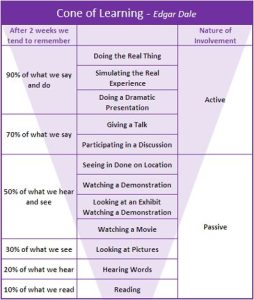Works Council learning pathways are essential for professional growth. Having a clear roadmap to guide the learning endeavours will make all the difference. Discover the power of structured training courses tailored to the Works Council’s needs.
Works Council training is essential for equipping members and entrepreneurs with the knowledge and skills needed to fulfil their roles effectively according to the Works Councils Act Netherlands.
However, the general belief is, the more information we have, the better our decisions will be and the more we learn. We even pursue more information that might even be inconsequential with our final decision!
In today’s dynamic business environment, staying ahead of the latest trends, Works Council regulations and HR practices is not just a desire but a necessity. Searching online for information can be overwhelming with all the available knowledge and whilst you might think you need more information, you sometimes don’t.
What happens is you MILK.
You have More Information but Less Knowledge.
Embark on a journey to elevate the Works Council expertise in our ever-changing professional landscape and learn about the crucial need for an effective learning path.
Table of Contents
What Is a Learning Pathway?
A learning path is essentially a personalised journey of acquiring knowledge and skills that are tailored to an individual’s professional goals or a group goal. It is more than a collection of training sessions. It is a well-thought-out sequence of learning experiences designed to build expertise progressively.
To understand the effectiveness of a learning path, let’s delve into Edgar Dale’s Cone of Learning. This is a theory that highlights different levels of retention based on the type of learning activity.
The idea is that individuals remember things better when they actively participate in activities instead of just passively receiving information, like reading or listening.
Depending only on reading and listening may lead to not remembering much. The active methods, such as interaction and participation in courses and programmes will enhance the learning experience. Practical demonstrations and simulations, such as user cases, or role-playing exercises are significantly boosting retention.

By understanding the significance of a learning path and incorporating Edgar Dale’s Cone of Learning, Works Councils can create a roadmap of training courses, that not only enhances their knowledge but also propels them toward success.
Works Council’s Training Right
Works Council training entitlements under the Dutch Works Councils Act are collective rights for the Works Council. According to Article 18 of the Works Councils Act Netherlands, the Works Council is entitled to a minimum of 5 days of training per year.
Why Does the Works Council Need Learning Pathways?
1. Goal Alignment
A learning path supports in aligning the objectives of the Works Council, such as skill development, and growth.
2. Efficient Learning
Having a defined learning path allows the Works Council to prioritise learning activities. It forces the Works Council to think about the primary topics of interest, instead of wandering through various topics with less focus.
3. Continuous Improvement
The learning path ensures that members stay ahead of the latest trends, tools, and best practices for Works Councils. It facilitates a mindset of continuous improvement, vital for the Works Council’s success.
4. Enhanced Motivation
Clear milestones and achievements along a learning path can boost the Works Council’s motivation to make an impact. Seeing progress, achieving goals, and mastering new skills contribute to a positive learning experience.
5. Measurable Progress and Making an Impact
With a learning path, the Works Council can track progress more effectively. Whether through practical applications, having measurable indicators ensures that the members of the Works Council are advancing their skills.
6. Prevention of Being Overwhelmed
The amount of information available can be overwhelming, not knowing where to begin or what to learn next. A learning path breaks down the learning process into manageable steps, preventing information overload and allowing members to grasp concepts gradually.
The Levels of Learning Pathways
A learning path is designed to give learners a clear route through various training courses. It breaks the knowledge down into manageable chunks, allowing learners to easily absorb information and progress smoothly through each course.
There are three types of learning paths – foundation, advanced, and excellence. Each learning path for the Works Council Netherlands aims to achieve a particular objective. The Human in Progress Academy has designed all Works Council courses to lead participants progressively through a series of skills and knowledge levels with a tiered learning approach.
Foundation
These courses prove fundamental knowledge and skills, serving as a starting point for members new to the Works Councils Act and this field.
Advanced
Building upon foundational concepts, these courses delve deeper into topics, offering a more in-depth understanding about communication and ways of working.
Excellence
At this level, courses aim for evolution, with advanced strategies, specialised knowledge, and an elevated level of expertise in Works Council subject matters.
Works Council Learning Pathways
Having outlined the learning path and the various levels of that path, the next inquiry arises: what training courses could include a Works Council learning path?
Step 1: Conduct Training Needs Analysis
A training analysis involves assessing the goals of the Works Council members and identifying areas where improvement is needed to help them achieve those goals. Works Council members should consider in the analysis:
- Personal learning objectives – What are my personal learning goals?
- Works Council’s learning objectives – What do we want to collectively learn as Works Council?
- Current skill levels – What is my current skill level?
- Key obstacles to learning improvement – What is missing, and do I need to improve my learning?
Step 2: Identify Skill Gaps
This step involves recognising the gaps between the current skills of Works Council members and compare this with the desired learning outcomes. Works Council members may consider the following questions:
- What are my objectives for improvement?
- Where do I want to be at the end of a course or multiple courses?
- What essential skills I am lacking and wish to acquire?
Step 3: Define Learning Goals
Take the results from step 1 and 2 and compose multiple learning goals. These goals will identify the skills, knowledge, and capabilities the Works Council members want to achieve by the time they have completed multiple training courses. This is the foundation a learning pathway is built on.
Step 4: Select the Works Council Training Courses
The Human in Progress Academy recognises that every individual has their unique learning style. Top performing professionals excel through reading and memory. Most of us need hands-on experience by physical and emotional memory to grasp new concepts and retaining knowledge.
The Human in Progress learning pathway is a customisable, on-demand learning solution designed to increase the knowledge of Works Council members. We offer practical masterclasses, courses, and programmes for Works Councils in the Netherlands, available in various formats, ensuring accessibility across online and offline platforms.
A sample of the Works Council courses offered are:
- Course Works Council Fundamentals
- Curriculum Works Council Fundamentals & Ways of Working
-
Course Works Council Committee Fundamentals
- Course Works Council & Arbo (Health & Safety)
- Course Works Council Communication
- Course Works Council Influence & Negotiation
- Masterclass Works Councils Act Netherlands
- Masterclass Dutch Employment Law
- Course Works Council Evolution
In addition to these courses, a tailor-made course or a combination of the open courses described above, could also be an option for the Works Council and its committees. This is known as a customised learning programme specifically designed to meet the unique needs, requirements, and goals of your Works Council.
The tailor-made course ensures that the learning experience is directly applicable with user cases of the Works Council that are being used to contribute to their success in their specific roles or fields.
Contact us for a free consultation to support you with the design of the Works Council learning pathways based on your defined learning goals.




